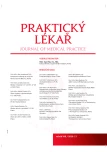Current possibilities of diagnostics and treatment of cartilaginous lesions of weight-bearing joints
Authors:
T. Otaševič 1; A. Šprláková-Puková 2
Authors‘ workplace:
Ortopedická klinika FN Brno a LF MU, Brno, Přednosta: prof. MUDr. Martin Repko, Ph. D.
1; Klinika radiologie a nukleární medicíny LF MU a FN, Brno, Přednosta: prof. MUDr. Vlastimil Válek, CSc., MBA
2
Published in:
Prakt. Lék. 2020; 100(3): 107-112
Category:
Reviews
Overview
Hyaline articular cartilage injuries of weight-bearing joints present for the patient a serious condition, that if left undiagnosed and treated appropriately, can lead to premature development of arthritis and permanent functional limitations. Articular surface damage can be seen in patients of all ages and may be clinically silent for a long time or present with non-specific symptoms. A general practitioner is often the first who comes into contact with patients after a large joint injury. Therefore, in addition to the more frequent cases of common contusions, distortions, ligament or meniscus injuries, should also consider the possibility of joint cartilage damage. The following article gives an overview of current possibilities of diagnosis and treatment of this orthopaedic-traumatological problematics.
Keywords:
magnetic resonance – hyaline cartilage – chondral defect – knee – ankle
Sources
1. Lüllmann-Rauch R. Histologie. Praha: Grada Publishing 2012.
2. Šprláková-Puková A, Vališ P, Mechl M. Zobrazování hyalinní chrupavky pomocí magnetické rezonance. Ces Radiol 2017; 71(4): 291–295.
3. Bekkers JEJ, Bartels LW, Benink RJ, et al. Delayed gadolinium enhanced MRI of cartilage (dGEMRIC) can be effectively applied for longitudinal cohort evaluation of articular cartilage regeneration. Osteoarthritis Cartilage 2013; 21(7): 943–949.
4. Voloshin I, Morse KR, Allred CD, et al. Arthroscopic evaluation of radiofrequency chondroplasty of the knee. Am J Sports Med 2007; 35(10): 1702–1707.
5. Erggelet C, Vavken P. Microfracture for the treatment of cartilage defects in the knee joint – a golden standard? J Clin Orthop Trauma 2016; 7(3): 145–152.
6. Steinwachs MR, Guggi T, Kreuz PC. Marrow stimulation techniques. Injury 2008; 39(Suppl 1): 26–31.
7. Hangody L, Füles P. Autologous osteochondral mosaicplasty for the treatment of full-thickness defects of weight-bearing joints: ten years of experimental and clinical experience. J Bone Joint Surg Am 2003; 85-A(Suppl 2): 25–32.
8. Fagan R, Furey AJ. Use of large osteochondral allografts in reconstruction of traumatic uncontained distal femoral defects. J Orthop 2014; 11(1): 43–47.
9. Brittberg M. Autologous chondrocyte implantation-technique and long-term follow-up. Injury 2008; 39(Suppl 1): 40–49.
10. Minas T, Peterson L. Autologous chondrocyte transplantation. Oper Tech Sports Med 2012; 20 : 72–86.
11. Irion VH, Flanigan DC. New and emerging techniques in cartilage repair: other scaffold-based cartilage treatment options. Oper Tech Sports Med 2013; 21(2): 125–137.
12. Filardo G, Kon E, Roffi A, et al. Scaffold-based repair for cartilage healing: a systematic review and technical note. Arthroscopy 2013; 29(1): 174–186.
13. Fischer S, Kisser A. Single-step scaffold-based cartilage repair in the knee: A systematic review. J Orthop 2016; 13(4): 246–253.
14. Benthien JP, Behrens P. The treatment of chondral and osteochondral defects of the knee with autologous matrix-induced chondrogenesis (AMIC): method description and recent developments. Knee Surg Sports Traumatol Arthrosc 2011; 19(8): 1316–1319.
Labels
General practitioner for children and adolescents General practitioner for adultsArticle was published in
General Practitioner

2020 Issue 3
- Advances in the Treatment of Myasthenia Gravis on the Horizon
- Memantine in Dementia Therapy – Current Findings and Possible Future Applications
- Memantine Eases Daily Life for Patients and Caregivers
- Possibilities of Using Metamizole in the Treatment of Acute Primary Headaches
- Metamizole at a Glance and in Practice – Effective Non-Opioid Analgesic for All Ages
-
All articles in this issue
- Current possibilities of diagnostics and treatment of cartilaginous lesions of weight-bearing joints
- Sociodemographic characteristics of the senior population and their impact on the level of health literacy: a literature review
- Occupational diseases reported in the Czech Republic in 2019
- Biochemical markers as a part of prenatal screening of chromosomal aberrations in the Czech Republic
- The role of the nurse and secondary prevention of stroke
- Methods of non-pharmacological treatment in rheumatoid arthritis
- Diagnosis and treatment of Latent Autoimmune Diabetes in Adults in everyday clinical practice
- Inflammatory back pain
- Parkinson’s disease and its impact on dignity of patient: case study using interpretative phenomenological analysis
- Vzdělávací portál ČLK: Digitální revoluce v akreditovaném vzdělávání lékařů
- Digitální ordinace bez starostí
- General Practitioner
- Journal archive
- Current issue
- About the journal
Most read in this issue
- Diagnosis and treatment of Latent Autoimmune Diabetes in Adults in everyday clinical practice
- Methods of non-pharmacological treatment in rheumatoid arthritis
- Current possibilities of diagnostics and treatment of cartilaginous lesions of weight-bearing joints
- The role of the nurse and secondary prevention of stroke
